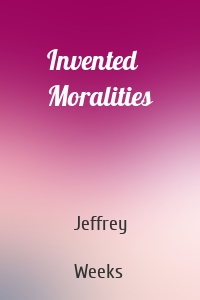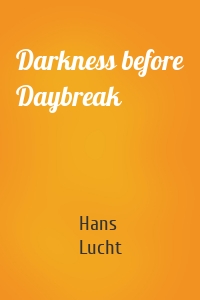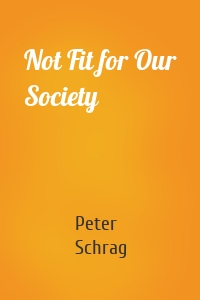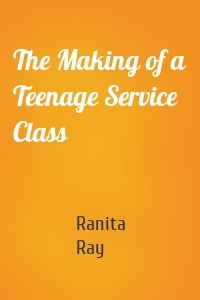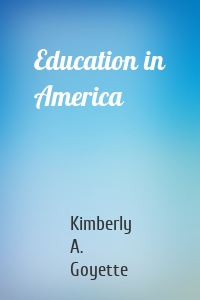Социология
5875 кн.
Professionalism Reborn
This book is an original interpretation of the professions and the role of the professional in Western industrial societies today.
| Автор | Eliot Freidson |
The Family and Its Future
The Novartis Foundation Series is a popular collection of the proceedings from Novartis Foundation Symposia, in which groups of leading scientists from a range of topics across biology, chemistry and medicine assembled to present papers and discuss results. The Novartis Foundation, originally known as the Ciba Foundation, is well known to scientists and clinicians around the world.
| Автор | CIBA Foundation Symposium |
Everyone's a Winner
Every kindergarten soccer player gets a trophy. Many high schools name dozens of seniors as valedictorians—of the same class. Cars sport bumper stickers that read «USA—Number 1.» Prizes proliferate in every corner of American society, and excellence is trumpeted with ratings that range from «Academy Award winner!» to «Best Neighborhood Pizza!» In <i>Everyone’s a Winner</i>, Joel Best— acclaimed author of <i>Damned Lies and Statistics</i> and many other books—shines a...
| Автор | Joel Best |
Rallying for Immigrant Rights
From Alaska to Florida, millions of immigrants and their supporters took to the streets across the United States to rally for immigrant rights in the spring of 2006. The scope and size of their protests, rallies, and boycotts made these the most significant events of political activism in the United States since the 1960s. This accessibly written volume offers the first comprehensive analysis of this historic moment. Perfect for students and general readers, its essays, written by a...
| Автор | Группа авторов |
Balancing Acts
In this timely examination of children of immigrants in New York and London, Natasha Kumar Warikoo asks, Is there a link between rap/hip-hop-influenced youth culture and motivation to succeed in school? Warikoo challenges teachers, administrators, and parents to look beneath the outward manifestations of youth culture – the clothing, music, and tough talk – to better understand the internal struggle faced by many minority students as they try to fit in with peers while working to lay the...
| Автор | Natasha Kumar Warikoo |
Royal Fever
No monarchy has proved more captivating than that of the British Royal Family. Across the globe, an estimated 2.4 billion people watched the wedding of Prince William and Catherine Middleton on television. In contemporary global consumer culture, why is the British monarchy still so compelling? Rooted in fieldwork conducted from 2005 to 2014, this book explores how and why consumers around the world leverage a wide range of products, services, and experiences to satisfy their fascination with...
| Автор | Pauline Maclaran |
The Future of Philanthropic Foundat...
The Novartis Foundation Series is a popular collection of the proceedings from Novartis Foundation Symposia, in which groups of leading scientists from a range of topics across biology, chemistry and medicine assembled to present papers and discuss results. The Novartis Foundation, originally known as the Ciba Foundation, is well known to scientists and clinicians around the world.
| Автор | CIBA Foundation Symposium |
Invented Moralities
This is an important intervention in debates on the family and sexuality, exploring clashes over sexual values and contemporary sexual dilemmas such as AIDS.
| Автор | Jeffrey Weeks |
Darkness before Daybreak
This riveting book chronicles the lives of a group of fishermen from Ghana who took the long and dangerous journey to Southern Italy in search of work in a cutthroat underground economy. A story that illuminates the nature of high-risk migration around the world, <i>Darkness before Daybreak </i>reveals the challenges and experiences of these international migrants who, like countless others, are often in the news but are rarely understood. Hans Lucht tells how these men live on the...
| Автор | Hans Lucht |
Not Fit for Our Society
In a book of deep and telling ironies, Peter Schrag provides essential background for understanding the fractious debate over immigration. Covering the earliest days of the Republic to current events, Schrag sets the modern immigration controversy within the context of three centuries of debate over the same questions about who exactly is fit for citizenship. He finds that nativism has long colored our national history, and that the fear—and loathing—of newcomers has provided one of the...
| Автор | Peter Schrag |
Enacting the Corporation
What are corporations, and to whom are they responsible? Anthropologist Marina Welker draws on two years of research at Newmont Mining Corporation’s Denver headquarters and its Batu Hijau copper and gold mine in Sumbawa, Indonesia, to address these questions. Against the backdrop of an emerging Corporate Social Responsibility movement and changing state dynamics in Indonesia, she shows how people enact the mining corporation in multiple ways: as an ore producer, employer, patron, promoter of...
| Автор | Marina Welker |
Enduring Bonds
In <I>Enduring Bonds</I>, Philip N. Cohen, renowned sociologist and blogger of the wildly popular and insightful <a data-saferedirecturl="https://www.google.com/url?hl=en&q=https://familyinequality.wordpress.com/&source=gmail&ust=1506571044423000&usg=AFQjCNFJ5dRQRLHGXB8zP3KQDwQ19ZFcfg" href="https://familyinequality.wordpress.com/" style="color: rgb(17, 85, 204); font-family: arial, sans-serif; font-size: 12.8px;"...
| Автор | Philip N. Cohen |
The Making of a Teenage Service Cla...
In <I>The Making of a Teenage Service Class, </I>Ranita Ray uncovers the pernicious consequences of focusing on risk behaviors such as drug use, gangs, violence, and teen parenthood as the key to ameliorating poverty. Ray recounts the three years she spent with sixteen poor black and brown youth, documenting their struggles to balance school and work while keeping commitments to family, friends, and lovers. Hunger, homelessness, untreated illnesses, and long hours spent traveling...
| Автор | Ranita Ray |
Closing the Rights Gap
Do «human rights»—as embodied in constitutions, national laws, and international agreements—foster improvements in the lives of the poor or otherwise marginalized populations? When, where, how, and under what conditions? <I>Closing the Rights Gap: From Human Rights to Social Transformation </I>systematically compares a range of case studies from around the world in order to clarify the conditions under which—and institutions through which—economic, social, and cultural rights are...
| Автор | Группа авторов |
Education in America
Education in America provides an essential, comprehensive introduction to education in the U.S., from its origins to its contemporary manifestations. Focusing on social inequality, Kimberly A. Goyette calls into question Horace Mann’s famous proclamation that education is the “great equalizer” and examines how education stratifies students based on socioeconomic background, race, and gender. She identifies the 'hidden curriculum' beneath equations...
| Автор | Kimberly A. Goyette |
Paradoxes of Green
This innovative multidisciplinary study considers the concept of green from multiple perspectives—aesthetic, architectural, environmental, political, and social—in the Kingdom of Bahrain, where green has a long and deep history of appearing cooling, productive, and prosperous—a radical contrast to the hot and hostile desert. Although green is often celebrated in cities as a counter to gray urban environments, green has not always been good for cities. Similarly,...
| Автор | Gareth Doherty |









